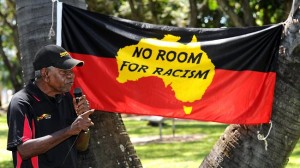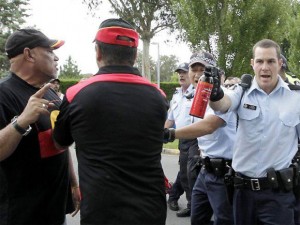It is sillier
than the vain futile cawing
of a senseless crow
to try to talk to others about one’s own deep sorrow!
(Wakayama Bakusai (1885-1928) trans. Robert Wood Clack)
 On Sunday afternoon while painting at Palm Beach, I received an email from my good friend Mr Julian Moti QC, the former Attorney-General of the Solomon Islands. Attached to Julian’s e-mail was one he had received from his friend and former colleague from the Solomon Islands Mr Stephen Lawrence. Mr Lawrence is currently the Aboriginal Legal Service NSW/ACT (“ALS”) principal solicitor (western zone) based in Dubbo and is attempting to bring to the governments attention the apparent anomalies in sentencing between rural and city offenders.
On Sunday afternoon while painting at Palm Beach, I received an email from my good friend Mr Julian Moti QC, the former Attorney-General of the Solomon Islands. Attached to Julian’s e-mail was one he had received from his friend and former colleague from the Solomon Islands Mr Stephen Lawrence. Mr Lawrence is currently the Aboriginal Legal Service NSW/ACT (“ALS”) principal solicitor (western zone) based in Dubbo and is attempting to bring to the governments attention the apparent anomalies in sentencing between rural and city offenders.
Julian asked me if BlakandBlack could raise the issues he had been discussing with his colleagues, I was more than happy to accommodate his request. The apparent anomalies, mentioned by Mr Lawrence, are well known and documented in legal and academic circles and stem in part from the lack of sentencing options available to the courts in rural areas. But, a lack of viable alternatives to full-time incarceration in rural areas is only part of the problem. There is a perceived, or perhaps real bias against Aboriginal defenders by the courts in rural NSW.
While working in a law firm in rural NSW a few years ago, the firm’s litigation expert, a former Sydney based Barrister who took the overflow work from the ALS in the area, noted to me that:
 “Crimes that would usually attract a community based order in the city result in incarceration in the country because of a lack of resources and therefore a lack of viable sentencing alternatives.” She however went on to note that “generally an Indigenous defender will be more harshly treated by the courts than a non-Indigenous defender…”
“Crimes that would usually attract a community based order in the city result in incarceration in the country because of a lack of resources and therefore a lack of viable sentencing alternatives.” She however went on to note that “generally an Indigenous defender will be more harshly treated by the courts than a non-Indigenous defender…”
That to me sounds like racism and should be considered in light of the three month custodial sentence handed out to one of our clients, an Indigenous woman, who was convicted of receiving a financial advantage by deception, to wit, the proceeds from the sale of a single $1 raffle ticket. I have discussed this issue previously in my post, Three months for a dollar. This outcome is worth comparing with one of the issues Mr Lawrence has been vocal about. I’m talking here about the case in which a 17-year-old Aboriginal boy, with virtually no criminal history was given a 12-month head sentence for stealing $70 of hamburger buns. Wonder what the sentence would have been if the offender were white?
The specifics of Mr Lawrence’s e-mail to Julian were two articles that appeared in The Australian on Friday 18 January, 2013. The first headed Postcode justice has long been a country crime, was written by Mr Lawrence. In this article Mr Lawrence noted that:
In western NSW last year, an Aboriginal child was arrested for stealing a bicycle and taken to court. It was his first offence and he was no threat to society. A plea of guilty was entered. The magistrate adjourned for several weeks for a report to be prepared and denied bail.
The inevitable Supreme Court bail application was lodged in Sydney and three weeks later granted. A frustrated colleague in Sydney later emailed me: “If this matter came before Parramatta or Bidura Childrens Court our client would have been sentenced on the spot (and may have received a caution). Alternatively, the court is likely to have considered dispensing with bail for the matter.”
A graphic demonstration that where you live effects the justice you receive. An example of “postcode justice”.
Is this postcode justice or is it racism? To my mind there are three facts that are relevant when discussing this case and Magistrate Roger Clisdell’s response, which was reported by Natasha Robinson and published in The Australian on the same day that Mr Lawrence’s article was published. The relevant facts are these: the offender is an Aboriginal child, it was his first offence and he pleaded guilty. These are all relevant facts that should have been taken into account by the court when determining bail; I’ll leave the issue of bail for a moment.
In responding, to Mr Lawrence’s criticisms, journalist Natasha Robinson noted in her article that:
Mr Clisdell blamed parental alcohol abuse, domestic violence and family breakdown for youth offending, but also took the opportunity to take aim at what he characterised as aggressive tactics by the ALS in defending their clients.
In an interview with The Australian, Mr Clisdell spoke of his frustration with the high rate of not-guilty pleas entered in the Bourke and Brewarrina jurisdictions, in particular for domestic violence matters and particularly relating to ALS clients.
“Where the ALS do a disservice to their clients is the constant inability to enter an early plea of guilty to charges where there clearly should have been a plea entered. The not guilty plea rate at Bourke and Brewarrina was close to 90 per cent,” he said.
Mr Clisdell suggested that defendants or their lawyers were aware victims would often fail to appear in court to testify, meaning that those who had pleaded not guilty would get off scot-free.
“It’s called the Bourke defence,” Mr Clisdell said.
“I don’t know whether the client is not prepared to acknowledge guilt, or whether there is an underlying idea that let’s make the police prove every single point. But it doesn’t do the clients much good if they get convicted after a hearing, and any discount that would have applied to a plea of guilty is forfeited.
Bully for Magistrate Clisdell and his views, but let’s go back to the case that Mr Lawrence cited in his article. The case, in which an Aboriginal child stole a bike, pleaded guilty and was denied bail. I’m not sure how entering a guilty plea demonstrates aggressive tactics on the part of the ALS. More importantly, after having entered a guilty plea, which should normally be taken into account in sentencing, the magistrate still denied the offender bail while awaiting a pre-sentencing report. These facts seem to fly in the face of Magistrate Clisdell’s assertions that the courts are blocked from showing leniency to ALS clients because of their propensity to enter non-guilty pleas.
At this point it’s worth highlighting some of the issues with guilty pleas and the dispensation of justice in Australia. During the course of my research into corruption and racism within the Australian Federal Police and other law enforcement bodies and agencies in Australia, I have taken statements from a large number of Indigenous people who claim that they were forced to enter into guilty pleas, when not guilty, because of economic circumstances.

Far from the ALS being in a position to manipulate the legal system by entering non-guilty pleas in “close to 90 per cent” of cases as alleged by Magistrate Clisdell, when I was more active in the community as ‘chuffer’ and travelling companion to my cousin the late Aunty Isabel Coe, the general consensus in the community was that the ALS pleaded out far too many cases because of budgetary constraints! The end result of this was that those defenders who were innocent of the allegations levelled against them by the ‘white’ dominated system of ‘just-us’ and pleaded guilty out of economic necessity, became in all practical senses a class of economic prisoners denied their rights by a white, racist judiciary and legal system.
Indeed the former Sydney bases barrister I worked with in rural NSW left the legal profession out of disgust at the way the police and the prosecution manipulated the system to achieve outcomes that had more to do with racism and stereotyping than they did with justice. Rather than criticise the ALS and its employees for trying to do the jobs in difficult and trying circumstances, I believe that it would be more beneficial for the overall cause of justice in Australia if Magistrate Clisdell, instead of taking ‘pot-shots’ at the hard working men and women of the ALS, got together with his brothers and sisters  at the bench and took a long hard look at what really goes on in Australia’s courts, the courts that they oversee. Until this is done, Australia will remain burdened with the injustice that we at BlakandBlack referrer to as white ‘just-us’.
at the bench and took a long hard look at what really goes on in Australia’s courts, the courts that they oversee. Until this is done, Australia will remain burdened with the injustice that we at BlakandBlack referrer to as white ‘just-us’.
I would also like to take this opportunity to remind all readers of the Australia Corroborate to be held at the Aboriginal Tent Embassy in Canberra – see you all there!
Viva La Revolucion




Actually Clisdell was not all that bad when he was in practice on the NSW South Coast.
Roger Clisdell would have to be the most fairest and knowledable person I have met when dealing with the legal system a (as a criminal mind you). They don’t come much better. Good on you, Your Honour for trying to highlight the truth – we need more sentencing options for ALL juveniles, particularly in regional areas.
It seems it takes a strong man with integrity to speak the truth which can be a real catalyst for change.
G’day Kathy,
Thanks for your comments. To be fair, friends at the Sydney bar who knew Roger Clisdell when he was a solicitor share your views. They expressed a view along the lines of “how could a man like him have changed so much?” Maybe he hasn’t, though as far as the NSW police are concerned, lying appears to be just par for the course, I remain comfortable with the comments I have made about the police. Magistrate Clisdell, well perhaps that’s another matter…
Anyway, thanks again for sharing your views, fair and frank criticism and/or support of the system can only help to strengthen it!
Cheers
Bakchos
Wake-up Clisdell the pigs lie, and they lie and they lie some more. Man you really do need a reality check!!!
Magistrate Clisdell and the reality of ‘just-us’ NSW style.
‘Just-us’ for whitie – now that says it all.